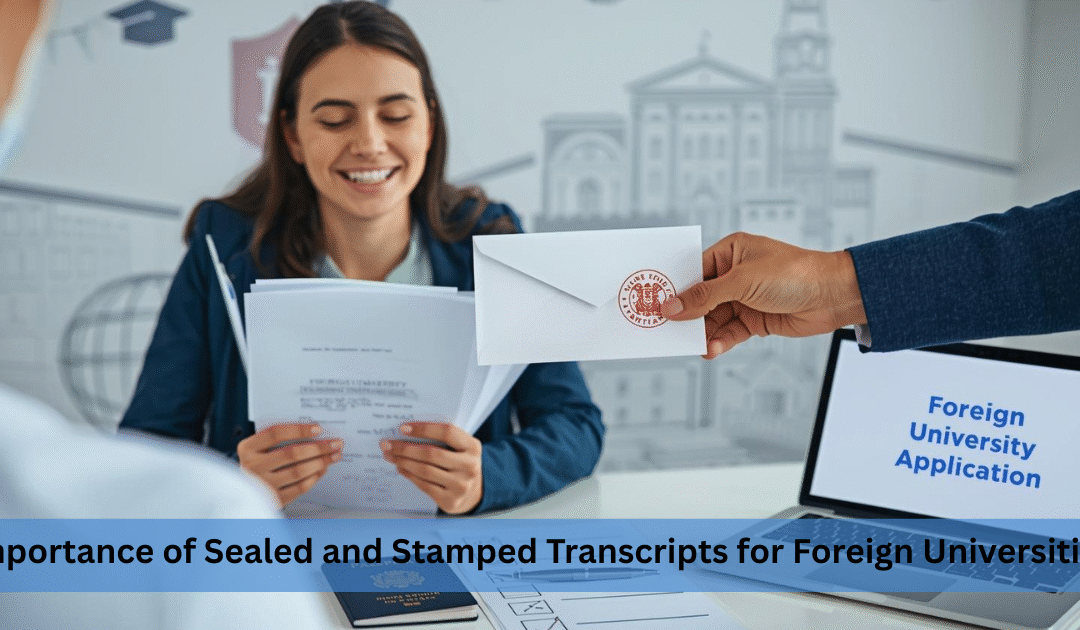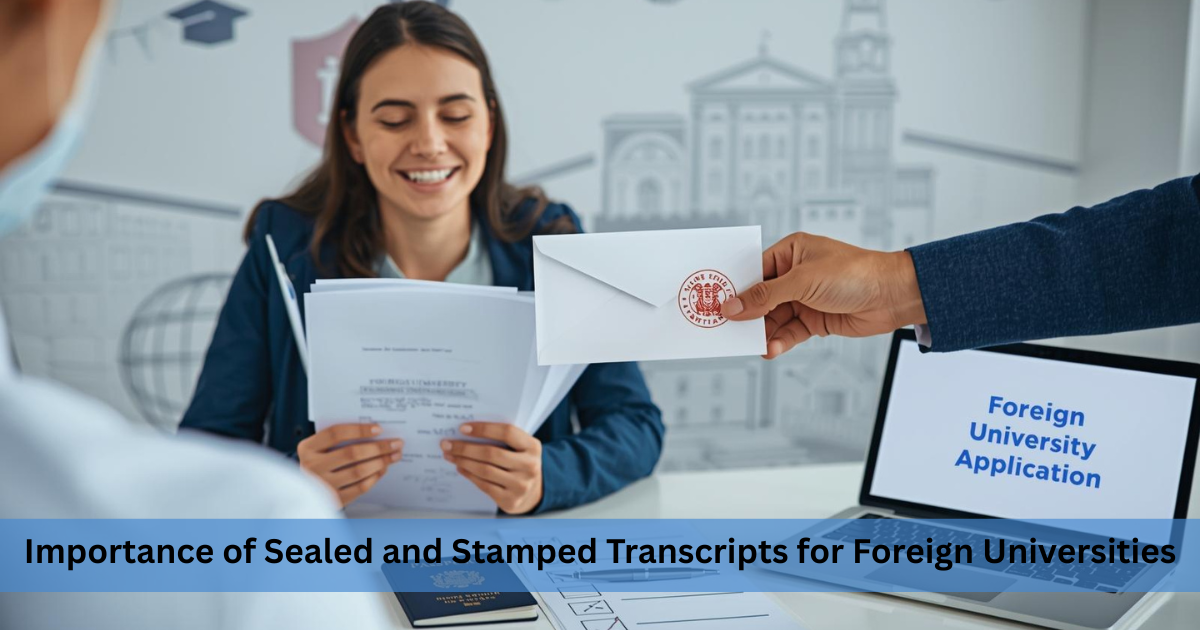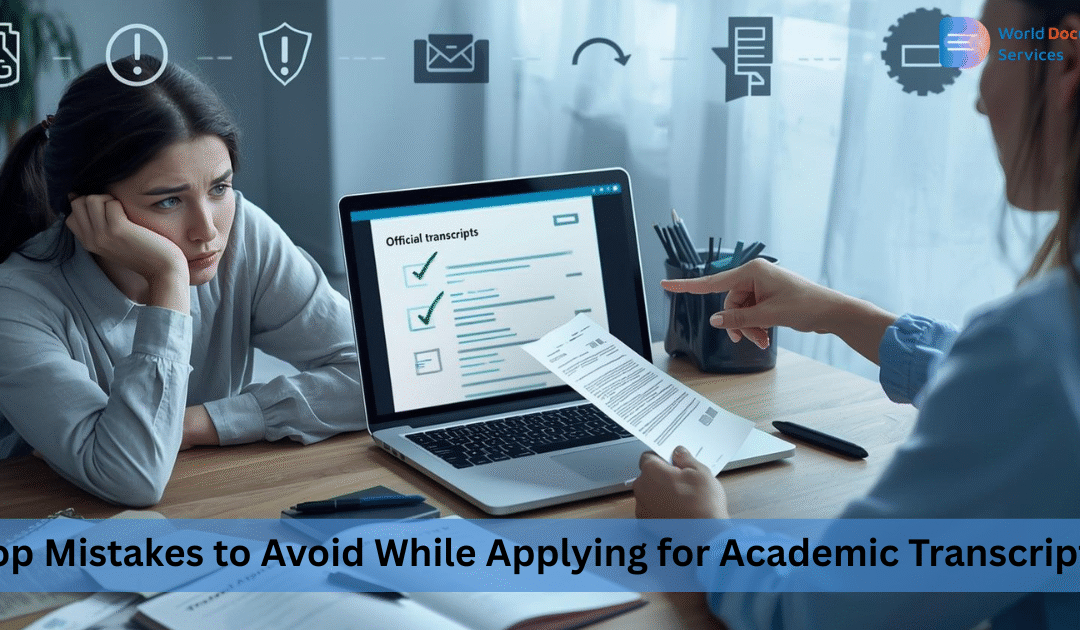
by World Document Services | Sep 30, 2025 | Transcripts Services

In today’s competitive global environment, pursuing education or employment outside one’s own country requires careful attention to document verification. One of the most important documents is sealed and stamped academic transcripts. This is a mandatory requirement from most foreign institutions and credentialing agencies in every country. Regardless of whether you’re applying for graduate studies, immigration, or international jobs, it is critical to have your transcripts packaged appropriately and authenticated.
This article will review the importance of sealed and stamped transcripts for foreign universities, their place in transcript services for PR, immigration, education, and employment, and whether you can manage the process using online transcript services or a reputable transcript service provider within India.
Need help with your PR, Higher Studies and Overseas Jobs? Contact Us Now!
What are stamped and sealed transcripts?
A stamped and sealed transcript is an official academic record issued by your university that is:
- Printed on college/university letterhead
- Authenticated with the official seal and signature by the registrar
- In an envelope addressed to a university or an official entity
- Stamped across the envelope flap to demonstrate that it has not been opened
In order to ensure the authenticity of your educational history, foreign colleges/universities and credential evaluation agencies only accept transcripts in sealed and stamped form. Informal or unsealed documents are instantly disqualified.
Why Do Sealed Transcripts Matter for Overseas Applications?
1. Mandatory Requirement for Higher Education
Most foreign universities require sealed transcripts during the admission process. Whether you’re applying to the U.S., Canada, the U.K., or Europe, educational transcripts for foreign universities must be sealed and attested.
Failing to comply can delay your application or cause outright rejection. Many universities even ask for transcripts to be sent directly by your institution or through certified transcript service providers.
2. Essential for PR and Immigration
When applying for Canada PR or other immigration programs, you’ll often need transcripts for Canada PR and WES or other credential evaluation bodies. These agencies assess your academic background through:
- Transcript evaluation for immigration
- Degree equivalency reports
To ensure authenticity, transcript services for PR require that transcripts be sealed and sent by the issuing university. Unofficial submissions are not accepted.
3. Compliance with WES and Credential Evaluation Agencies
For WES and similar bodies, transcript services for WES require sealed transcripts sent either by post or electronically (if your institution is enrolled in a digital transfer program).
Sealed transcripts:
- Reduce fraud
- Establish credibility
- Speed up foreign credential transcript services.
If your university isn’t WES-verified, you must ensure physical delivery of sealed and stamped transcripts.
4. Vital for International Employment
Employers abroad, especially in sectors like healthcare, engineering, and law, require verified transcripts for jobs abroad to validate your educational qualifications.
This is where transcript attestation for international employment plays a crucial role. Some countries even require multiple levels of attestation:
- University seal
- Notary or HRD stamp
- Embassy or MEA (Ministry of External Affairs) verification
Hence, getting your transcripts sealed is not just a formality; it’s an international standard of credibility.
5. Prevents Document Fraud
In the age of deepfakes and forged documents, sealed and stamped transcripts act as a secure method of verification. They help:
- Mitigate academic fraud
- Protect the reputation of educational institutions.
- Ensure your application is viewed as legitimate.
This is why top agencies offering academic transcript services for overseas applications emphasize sealed transcript documentation above all.
How to Apply for Sealed and Stamped Transcripts?
The process varies by university, but generally involves application through the university portal or a recognized transcript service provider in India.
Submission of:
- All semester mark sheets
- Degree certificate
- ID proof
- Payment of processing and courier fees
Option to send directly to the institution or evaluation body
You can also apply for a transcript online through the best transcript services in India, like WDS, which liaise directly with your university to ensure secure and fast processing.
Online Transcript Services: A Game-Changer
With digitization, online transcript services have simplified the tedious process of visiting your university multiple times. Leading providers:
- Manage the paperwork end-to-end
- Coordinate directly with institutions.
- Ensure transcripts are sealed, stamped, and sent in compliance with international standards.
This is particularly useful when you’re overseas or dealing with universities that have complex bureaucracy.
Choosing the Right Transcript Partner:
Not all providers offer the same level of compliance. Here’s what you should look for in a transcript service provider in India:
- Experience with transcript documentation for abroad education
- Strong track record with WES and immigration agencies
- Transparent pricing and fast turnaround
- End-to-end service (from application to attestation and courier)
- Real-time tracking and customer support
Conclusion
The importance of sealed and stamped transcripts in your journey to study, settle, or work abroad cannot be overstated. Whether you’re pursuing transcripts for higher studies abroad, transcript services for immigration, or seeking transcripts required for international jobs, proper documentation is non-negotiable.
Without sealed and stamped transcripts, your application is incomplete regardless of your grades, experience, or ambition. To ensure a smooth journey, leverage foreign credential transcript services or online transcript services offered by the best transcript services in India.
Don’t leave your global dreams to chance; get your transcripts done right the first time.
Download the World Document Services App
You may enjoy a hassle-free experience by downloading our mobile app from either the App Store or the Play Store. It works with both iOS and Android devices.
Frequently Asked Questions (FAQs)
Q: Are sealed transcripts mandatory for WES evaluation?
A: Yes. WES only accepts transcripts that are sealed and sent directly by the issuing institution or via approved transcript service providers.
Q: Can I submit unsealed transcripts for university applications abroad?
A: No. Most foreign universities require sealed and stamped transcripts. Unsealed or self-submitted documents may lead to application rejection.
Q: How can I apply for sealed transcripts online?
A: You can apply for a transcript online through your university’s official portal or via professional online transcript services like WDS that manage the process end-to-end.
Q: Are sealed transcripts needed for job applications abroad?
A: Yes. Especially in regulated professions or visa-based employment roles, transcripts for jobs abroad must be attested, sealed, and officially verified.
Q: How long does it take to get sealed transcripts through a service provider?
A: Typically, it takes 2–4 weeks, depending on your university. Partnering with a reliable transcript service provider in India can help expedite the process and ensure compliance.

by World Document Services | Sep 27, 2025 | International Studies

In a globalized era, ordering academic transcripts for international applications is not just a bureaucratic process any longer but is now an essential part of any international journey. Whether applying for permanent residency (PR), proceeding to higher education abroad, or working overseas, authenticated transcripts are required.
This article provides a deep dive into the importance of transcript services for PR, transcripts for higher studies abroad, and transcripts for jobs abroad, along with insights into where to get them, how to apply, and what to expect during the process.
Need help with your PR, Higher Studies and Overseas Jobs? Contact Us Now!
What is the purpose of transcripts for overseas applications?
Transcripts are formal records produced by your school or institution regarding your academic performance, documenting what subjects you studied, what grades you earned, and the length of your course. They are simply formal proof of education, which is particularly important for the following:
- Immigration and PR Applications (e.g., transcripts for Canada PR and WES)
- University Entrance Applications (e.g., educational transcripts for foreign universities)
- Foreign Employment Opportunities (e.g., transcripts for international jobs)
So, simply put, if you are missing transcript documentation, your application regarding education, immigration, or employment may be considered incomplete or even denied.
Use Cases of Transcript Services:
1. Transcript Services for PR and Immigration
When applying for PR in countries like Canada or Australia, your education must be verified by credential evaluation agencies such as WES (World Education Services). This process involves transcript evaluation for immigration, wherein your academic transcripts are compared to the educational standards of the host country.
Transcript services for WES typically require:
- Original mark sheets
- Degree certificates
- Institutional attestation and sealing
Institutions must send these documents directly to WES or any other organization in sealed, stamped envelopes or electronically via online transcript services.
2. Transcripts for Higher Studies Abroad
Applying to international universities demands that you get transcripts for study abroad that are accurately compiled, attested, and formatted as per foreign academic standards. For example, many US and UK universities require:
- Subject-wise breakdown
- Cumulative GPA (if available)
- Course credits or hours
Using foreign credential transcript services, you can ensure your documentation aligns with institutional requirements for transcripts for higher studies abroad.
3. Transcripts for Jobs Abroad
For international employment, especially in regulated professions (engineering, medicine, law, etc.), transcript attestation for international employment is often mandatory. Countries in the Middle East, Europe, and North America may request transcripts for jobs abroad to validate your educational qualifications.
These need to be authenticated through:
- University attestation
- HRD (Human Resource Development) attestation
- Embassy attestation (depending on the country)
What Makes a Transcript Valid Internationally?
A valid transcript must meet the following criteria:
- Issued by a recognized educational institution
- Clearly list all semesters, grades, and subjects.
- Official seal and signature of the registrar
- Submitted directly to requesting agencies/universities
- (In many cases) be in English or translated by a certified agency
When using a transcript service provider in India, make sure they adhere to the protocol for transcript documentation for abroad education and international job markets.
How to Apply for Transcripts Online?
Thanks to digitization, many universities now offer online transcript services. You can apply for a transcript online in the following steps:
- Visit the university’s official website and navigate to the transcript section.
- Register/log in with your student credentials or alumni ID.
- Fill in the transcript application form with accurate course details.
- Upload necessary documents (mark sheets, ID proof, etc.).
- Pay the required transcript processing fee.
- Choose your delivery option: physical courier or electronic submission to agencies like WES.
Using one of the best transcript services in India, like World Document Services (WDS), you can outsource the process for better accuracy, faster turnaround, and peace of mind.
Benefits of Using Professional Transcript Services
Partnering with a verified transcript service provider in India ensures:
- End-to-end management of transcript procurement
- Timely attestation and dispatch
- Country-specific formatting
- Electronic delivery to WES or other evaluation bodies
- Expert assistance with university or embassy coordination
This approach minimizes errors and delays, both fatal to overseas application timelines.
Top Qualities of a Reliable Transcript Partner:
If you’re comparing providers for foreign credential transcript services, assess them based on:
- Experience with international documentation
- Turnaround time
- Pricing transparency
- Attestation support (HRD, MEA, Embassy)
- Real-time tracking
- Online convenience
Providers like WDS are known for offering streamlined, professional, and compliant transcript solutions tailored to immigration, education, and employment abroad.
Conclusion
Whether you’re aiming for Canada PR, applying to a UK university, or pursuing a career opportunity in Dubai, transcripts are non-negotiable. They are more than just academic records; they’re your gateway to global opportunities.
By leveraging academic transcript services for overseas applications, especially via reliable online transcript services, you fast-track your journey and reduce the risk of rejection or delay.
If you’re navigating this process for the first time, partner with the best transcript services in India not only to save time but also to ensure accuracy, credibility, and peace of mind.
Download the World Document Services App
You may enjoy a hassle-free experience by downloading our mobile app from either the App Store or the Play Store. It works with both iOS and Android devices.
Frequently Asked Questions (FAQs)
Q: How long does it take to get transcripts for WES?
A: It typically takes 2 to 4 weeks, depending on the university and the responsiveness of the registrar’s office. Using a professional service can reduce this timeline.
Q: Are transcripts required for international job applications?
A: Yes. Many employers abroad demand transcripts for jobs abroad as part of their due diligence, especially for technical and regulated roles.
Q: Can I apply for my transcript online?
A: Absolutely. Most Indian universities now support online transcript services. Additionally, you can hire verified agencies to apply for transcripts online on your behalf.
Q: What is the cost of transcript services in India?
A: Costs vary by university and service provider. Expect to pay anywhere from ₹2,000 to ₹10,000, including courier and attestation fees.
Q: What documents are required to apply for a transcript for study abroad?
A: Typically, you’ll need:
- All semester mark sheets
- Degree certificate
- ID proof
- Authorization letter (if someone else is applying on your behalf)
Need help with transcript attestation or WES documentation? Reach out to a trusted transcript service provider in India and take the guesswork out of global applications.

by World Document Services | Sep 26, 2025 | International Evaluations

In today’s competitive global world, foreign professionals and students who intentions of studying, working, or settling in another country often require a WES education credential assessment. One of the most recognized credential evaluation bodies is World Education Services (WES), an organization that helps convert academic credentials obtained in your home country to Canadian or U.S. equivalencies.
However, one of the most commonly overlooked yet essential aspects of your WES evaluation process is ensuring that your transcripts are accurate, sealed, and provided in accordance with strict WES transcript standards.
If you intend to apply for a WES evaluation, you can follow this guide, which will guide you through all essential steps, including preparing your documents, using online transcript services, and sending your transcripts to WES correctly.
Need help with your Apply for WES Evaluation? Contact Us Now!
What is WES, and why is WES important?
WES (World Education Services) is a nonprofit organization specializing in the evaluation of academic credentials from outside of the U.S. and Canada. A WES evaluation for foreign degrees helps Canadian and American employers, universities, and immigration agencies understand the worth of your foreign education.
To apply for permanent residency, higher education, or licensing, WES ensures you are able to validate your foreign degree in an equivalent format, making it a necessary step in your international career plan.
Step-by-Step Guide: How to Apply for a WES Evaluation with Correct Transcripts
Step 1: Create an Account on the WES Portal
The first step is to register on the WES website. During the application, choose the type of evaluation you need:
- Document-by-Document Evaluation (For Immigration)
- Course-by-Course Evaluation (For Higher Education)
Once done, you will receive a WES reference number, which must be mentioned in all future correspondence and on your transcript envelope.
Step 2: Understand WES Transcript Requirements
WES is extremely strict about transcript format and how documents are submitted.
Here are the key WES academic transcript guidelines:
- Transcripts must be sent directly by the university, not by you.
- They must be sealed and stamped across the flap.
- A cover letter with the WES reference number must be included.
- Digital submissions are accepted only if sent through WES-approved digital platforms.
- Understanding the WES document submission process is essential. Non-compliance can lead to rejections and delays of up to 6–8 weeks.
Step 3: Apply for Transcripts from Your University
Now, it’s time to apply for transcripts online from your university (if available). If your institution doesn’t offer a digital platform, you’ll need to apply physically or through a transcript service provider in India.
Here’s what you typically need:
- All semester-wise mark sheets (attested copies)
- Provisional/degree certificate
- University ID proof (if applicable)
- WES cover letter with reference number
Many candidates prefer using the best transcript services in India to manage this phase due to the time-consuming and bureaucratic nature of the Indian university systems.
Step 4: Use Online Transcript Services for Convenience
Navigating the administrative maze of Indian universities can be overwhelming. That’s where online transcript services play a game-changing role.
These platforms:
- Collect and verify your documents.
- Coordinate with universities on your behalf.
- Package and send transcripts to WES.
- Offer real-time tracking and status updates.
- Choosing a reliable transcript service provider in India saves time, ensures accuracy, and significantly reduces the risk of rejection by WES.
Step 5: Send Transcripts to WES
Once your transcripts are ready and sealed, they must be sent directly by the university or through an approved transcript service. WES has designated receiving addresses depending on the region (Canada or the USA).
Make sure:
- The envelope has your WES reference number clearly written.
- The courier service used is trackable and internationally recognized.
- You retain the receipt and tracking ID for follow-ups.
Some of the best transcript services in India even provide direct-to-WES shipping and pre-filled WES courier labels.
Common Mistakes to Avoid:
- Sending transcripts yourself (WES rejects this)
- Using unsealed or incorrectly stamped envelopes
- Not including the WES reference number
- Relying on unverified third-party agents
- Submitting incomplete mark sheets or documents
To apply for WES with accurate transcripts, attention to detail is paramount.
Frequently Asked Questions (FAQs)
Q: Can I courier my transcripts to WES myself?
A: No. WES will only accept transcripts sent directly by the issuing institution or via WES-approved platforms. If you send them personally, they will be rejected.
Q: What is the cost of a WES evaluation?
A: The basic WES credential evaluation starts at around USD 160. This does not include courier or transcript procurement charges.
Q: How long does the WES evaluation process take?
A: After WES receives all required documents, the evaluation typically takes seven business days. Delays may occur if documents don’t meet WES transcript requirements.
Q: Can I use WES for immigration and higher studies simultaneously?
A: It depends on the evaluation type. Immigration typically requires a document-by-document report. Academic purposes usually need a course-by-course evaluation. You can request duplicate reports for different purposes.
Q: How can I track my transcript dispatch to WES?
A: If you use an online transcript platform or transcript service provider in India, they often offer tracking through courier partners. WES also updates the document status on your dashboard once received.
Conclusion
Securing a WES education credential assessment with the right transcripts is the first step toward unlocking international academic and career opportunities. But doing it right means understanding the WES evaluation process, strictly following WES transcript requirements, and leveraging online transcript services to minimize errors and delays.
In a system where one misplaced stamp or a late delivery can cost weeks of waiting, it’s always better to be proactive. Use trusted transcript service providers in India, plan ahead, and ensure your documents meet every WES standard before dispatch.
Download the World Document Services App
You may enjoy a hassle-free experience by downloading our mobile app from either the App Store or the Play Store. It works with both iOS and Android devices.

by World Document Services | Sep 25, 2025 | Transcripts Services

Applying for academic transcripts may seem straightforward, but a small discrepancy in your actions when applying for transcripts can result in substantial delays, denials, and missed life-altering opportunities when working on deadlines for WES, IQAS, or applications. Our lives are extraordinarily dependent on deadlines. If you’re a student applying for a higher education program in another country or a working professional applying for PR or credential evaluation, knowing what NOT to do is just as important as knowing what to do.
Need help with your Applying for Academic Transcripts? Contact Us Now!
In this article, I will walk you through each of the most common and biggest mistakes to avoid when applying for academic transcripts and give you some practical academic transcript application tips so that your academic transcript application process is easy and straightforward.
1. Unclear about the transcript requirements:
One of the common mistakes applicants usually make is to incorrectly assume that a transcript will have a standard format that will be essentially similar among all universities. Academic transcript requirements will vary due to the country, institution, and purpose (i.e., further studies, migration, or credential assessment by organizations like WES or IQAS).
What to do instead:
Always verify the specific transcript format and submission method required by your target institution or authority. Some institutions require sealed and stamped envelopes, while others may accept digital submissions through official portals or approved online transcript services.
2. Applying Without Checking University-Specific Guidelines:
Each university in India has its own academic transcript process. Some require you to fill out physical forms; others allow you to apply for transcripts online. Missing out on key steps like notarization, document authentication, or university fee submission can derail your application.
What to do instead:
Visit the official website of your university or consult a reliable transcript service provider in India. Understand their step-by-step process and list of required documents before starting your academic transcript application.
3. Incomplete or Incorrect Documentation:
Submitting incomplete or incorrect documents is a major reason for transcript delays. This includes:
- Incorrect semester mark sheets
- Mismatch in name/spelling
- Missing passing certificate
- Unattested photocopies
- Wrong envelope labelling
These issues often require resubmission, which delays the entire transcript application process by weeks or even months.
What to do instead:
Cross-check your documents thoroughly. Make sure your mark sheets are legible, stamped, and signed if required. Use an updated checklist provided by the best transcript services in India or your university’s website.
4. Choosing Unreliable or Unverified Service Providers:
With the growing trend to apply for transcripts online, many students turn to third-party transcript service providers in India. While many are legitimate, several are not. Unverified services can lead to misplaced documents, data breaches, and fraudulent activity.
What to do instead:
Choose only trusted and highly reviewed online transcript services. Look for providers that are registered businesses, have verified contact details, and offer trackable order management. You can also check for their affiliation with recognized institutions or credential evaluation bodies.
5. Ignoring Processing Timelines:
Every university takes a different amount of time to process transcript applications. Ignoring timelines or assuming a transcript will be delivered in a few days can lead to missed deadlines for admissions or visa processes.
What to do instead:
Start your academic transcript application process at least 2-3 months in advance. Factor in delays due to holidays, internal university backlogs, and courier transit time. Ask the university or service provider about the current TAT (turnaround time).
6. Not Tracking the Application Status:
Many applicants simply submit their documents and wait passively. Without proactive tracking, you won’t know if your application is stuck, rejected, or dispatched incorrectly. This is especially risky if you’re sending transcripts to foreign credential agencies.
What to do instead:
When you apply for academic transcripts, insist on application tracking—either through an online portal or manual follow-ups. If using a transcript service provider in India, ensure they provide regular updates and tracking numbers once the transcript is dispatched.
7. Neglecting International Shipping Requirements:
If you’re applying to a foreign university or evaluation body, transcript envelopes often must be sealed, stamped, and sent directly by the issuing institution. Some universities reject transcripts not sent through official means.
What to do instead:
Always verify the mode of delivery accepted by the recipient. Partner with a transcript service provider in India that has experience in handling international courier standards, or opt for the best transcript services in India that offer direct-to-WES/IQAS delivery options.
FAQs: Common Questions About Academic Transcript Applications
Q: What is the difference between mark sheets and academic transcripts?
A: Mark sheets show subject-wise scores for each semester, while academic transcripts consolidate all academic performance, usually in an official format with the university’s seal and signature. Transcripts are required for foreign education, PR, or employment verification.
Q: Can I apply for academic transcripts online?
A: Yes. Many universities now allow students to apply for transcripts online through dedicated portals. Alternatively, you can use authorized online transcript services that manage document collection, application, and dispatch.
Q: What is the average time taken to get academic transcripts?
A: It varies. Some universities take 15-20 working days; others may take up to 45 days, depending on backlog and internal approval cycles. Using the best transcript services in India can help fast-track the process through experience and follow-ups.
Q: Can I apply for someone else’s transcripts on their behalf?
A: Yes, most universities allow third-party applications with authorization letters and valid ID proofs. This is especially useful for NRIs or professionals living abroad. Many transcript service providers in India offer representation services.
Q: What should I look for in a good transcript service provider?
A: Look for credibility, transparency in pricing, real-time tracking, prior experience with your university, international shipping support, and customer support. Reputable providers often display verified reviews and offer secure document handling.
Conclusion
Applying for academic transcripts doesn’t have to be stressful—but only if you avoid common pitfalls like incomplete applications, unreliable service providers, and poor planning. With the increasing acceptance of online transcript services, applicants now have the flexibility to manage the process more efficiently. However, that flexibility also demands responsibility.
By staying informed, planning ahead, and partnering with trusted transcript service providers in India, you can simplify the academic transcript application journey and meet your goals, whether it’s further studies, immigration, or global employment.
Download the World Document Services App
You may enjoy a hassle-free experience by downloading our mobile app from either the App Store or the Play Store. It works with both iOS and Android devices.

by World Document Services | Sep 11, 2025 | Transcripts from University

In this world where academics and education play an important role, university transcripts are of very high importance. These documents are usually called academic records, reflecting a student’s performance and achievement during the entire academic period. If you are planning to immigrate abroad for a job or for higher studies, your transcript is an essential credential document you must carry. In this article, we will understand how university transcript services work and why they are important for various academic and professional goals.
Need help with your University Transcript Services? Contact Us Now!
What Are University Transcript Services?
University transcript services are a way of obtaining professional solutions provided by the institutions and agencies, or online platforms, for obtaining your official academic transcripts. These services are mostly for the benefit of students and alumni of any particular university wanting to study abroad or immigrate for any of the reasons.
These services ensure that the transcripts are accurately processed, authenticated, and securely delivered to the desired institution or organization by the students.
How University Transcript Services Operate
1. Requesting transcripts: The process initiates when the applicants submit an application to their university. This can be both online and offline.
2. Verification and authentication: The documents are verified, and credentials are checked before the transcript is processed. Checking the documents helps the university verify the authenticity of the applicant. This process is known as university transcript verification.
3. Preparation of Transcripts: Once verified, the university prepares the official document. The transcript usually includes:
- The student’s name and identification number.
- The courses taken, grades achieved, and credits earned.
- The academic year and semester details.
- The overall GPA or percentage.
4. Delivery Options: Most universities now provide online university transcript services and allow students to request their transcripts electronically. Copies may be delivered through postal or courier services upon request. The security of the document is guaranteed during delivery.
5. Additional Services: Some offer professional transcript services, which include document translation, notarization, or attestation for international applications.
Types of Transcript Services
Online Transcript Services
Digital platforms have made a drastic change in how transcripts are requested and delivered. Within just a few clicks, students can:
- Submit requests.
- Track the status of their applications.
- Receive soft copies for immediate use.
Professional Transcript Services
For international applications or complex requirements, professional services help in the following ways:
- Document verification.
- Credential evaluations.
- Official translations in multiple languages.
University Transcript Verification
This service ensures that the transcript is authentic and matches the academic records held by the issuing institution. It is necessary for:
- University admissions.
- Job applications.
- Immigration procedures.
Why Are Transcript Services Important?
1. Seamless Applications
When applying to universities or jobs, transcripts act as proof of your academic qualifications, ensuring a smooth application process.
2. Professional Credibility
Verified transcripts enhance credibility, especially when seeking employment or opportunities in foreign countries.
3. Saves Time and Effort
With online university transcript services, the process is streamlined, saving applicants from the hassle of visiting universities in person.
4. Meets International Standards
For students applying abroad, these services ensure that transcripts meet the specific requirements of foreign universities and organizations.
Common Challenges in Transcript Services
- Delays with Processing: Universities have lengthy timelines for processing the transcripts, which can be a challenge for applicants who need their documents with the utmost urgency.
- Errors in Academic Records: Mistakes in any of the submitted documents can cause an issue in the entire application.
- Lost Documents: The traditional postal services always happen to make an error while delivering the document, emphasizing the need for reliable postal services. This can help in avoiding the delay of the entire process.
- Limited Awareness: Many people aren’t aware of such academic transcript services that can help you get your documents to your doorstep with ease. Helping you to avoid all the hurdles.
How to Choose the Right University Transcript Service
Consider the factors before opting for the right service providers.
- Reputation: When opting for the service providers, ensure to choose the services with positive reviews and track records, like World Document Services, ensuring the accuracy and timely delivery.
- Cost: Try comparing the prices with those of another service provider to ensure that you are not being overcharged.
- Turn-around time: The time required for processing and delivery ought to be taken into account, especially if you are working with urgent deadlines.
- Additional Features: Look for services that offer add-ons like verification, translation, or attestation.
Conclusion
Student and alumni access to their transcripts has been made easy through the transcription services provided by universities. Online solutions and professional support guarantee the accuracy of all transcripts, issued and distributed within a stipulated timeframe for various academic and professional uses.
Once students become familiar with how such services work, they will feel confident in the process and use less time and effort.
All individuals seeking further study, job vacancies, or immigration always want to avail themselves of opportunities through the transcript service for their application to be highly rated.
Download the World Document Services App
You may enjoy a hassle-free experience by downloading our mobile app from either the App Store or the Play Store. It works with both iOS and Android devices.
FAQs
Q: What is the difference between an academic transcript and a degree certificate?
A: An academic transcript details your coursework, grades, and academic achievements, whereas a degree certificate is proof of graduation.
Q: Can I get my university transcript online?
A: Yes, many universities now provide online transcript services where you can request, track, and receive your transcript digitally.
Q: How long does it take to process a transcript request?
A: Processing times vary by university but typically range from a few days to several weeks. Using professional transcript services can expedite the process.
Q: What should I do if there’s an error in my transcript?
A: Contact your university’s registrar or academic office immediately to request corrections. University transcript verification ensures accuracy before submission.
Q: Are digital transcripts accepted by all institutions?
A: Most universities and employers accept digital transcripts, but it’s always best to check the specific requirements of the institution or organization.
Q: How can I track my transcript request?
A: Universities and online transcript services usually provide tracking features to monitor your application status.
Page 1 of 2812345...1020...»Last »











 Call Us
Call Us Mail Us
Mail Us WhatsApp
WhatsApp
